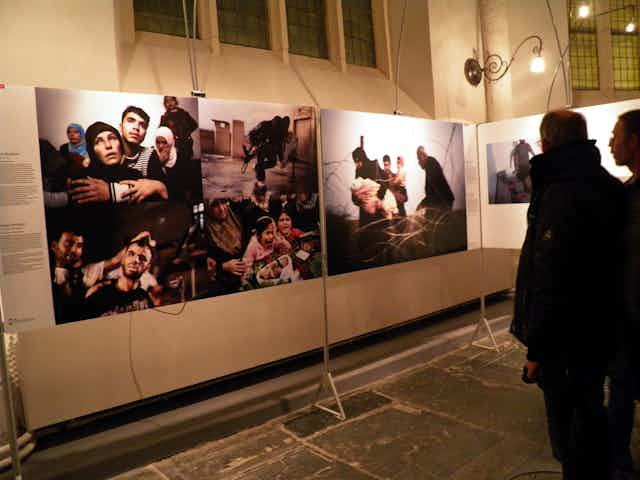The humanitarian crisis in Syria is no longer news. It is simple fact: tragedy writ large, as cities burn and lives are ruined. Our eyes may widen at the sheer scale of this destruction: four million people in need of humanitarian assistance, half a million people uprooted. But it’s no longer news. News now is what happens on the edges of this inaction, as the Great Powers debate what is to be done about Syria, while actually continuing to do very little.
In the past week, a precarious ceasefire in the Syrian city of Homs has allowed humanitarian agencies a brief window of access to evacuate a few hundred civilians. But the likelihood is that soon, this ceasefire will break. And while it is Homs that has flickered across our news screens, there are other cities suffering in Syria too. It has been estimated that some 250,000 Syrian civilians are currently under siege.
Nevertheless, as peace talks crawl to a halt in Geneva, negotiations are also underway in New York in an attempt to agree a UN Security Council resolution that would demand an end to the sieges, the unhindered evacuation of civilians and humanitarian access across conflict lines and borders – and empower the UN to use “levers” if compliance is not forthcoming.
All aid is political
Even as op-eds in US newspapers call for Assad and the Syrian rebels to be given 48 hours to “allow humanitarian aid to flow or be subject to attack”, pushing the case for intervention, Russia has vowed to veto any resolution that calls for sanctions, decrying the measure as “political”.
But of course it is. All aid is political. Humanitarianism does not exist in a vacuum. Neutrality, impartiality and independence may be sacred values, but as one of the most eminent scholars of humanitarianism, Michael Barnett, reminds us, they are nonetheless values that were deliberately invented to serve a purpose:
The International Committee of the Red Cross (ICRC) did not discover a definition waiting to be found: rather it crafted a definition in response to constraints on its goals of aid.
From the Geneva Convention onwards, the entire humanitarian project is a history lesson in the politics of being apolitical.
This was acknowledged by Médecins Sans Frontières (MSF) in a revealing collection published in 2011, Humanitarian Negotiations Revealed, in which the humanitarian project to build a space beyond politics is defended as an inherently political task:
MSF’s freedom of action is not rooted in a legal and moral “space of sovereignty” that simply needs to be proclaimed in order to be automatically acknowledged and respected. It is the product of repeated transactions with local and international political and military forces. Its scope depends largely on the organisation’s ambitions, the diplomatic and political support it can rely on and the interest taken in its action by those in power.
Why, then, do so many states insist that aid is not and must not be about politics, when their own actions demonstrate the opposite? For if this time it is Russia’s turn to cry “politics” – as a supporter of the Assad regime and through its own authoritarian wars with separatist Islamists in places like Chechnya, this serves its own political interest – Russia is not alone. The UK Government, for instance, has made much political hay touting its £600m contribution to humanitarian aid budgets in the region as justification for why it cannot possibly take more than 500 Syrian refugees in response to an emergency resettlement appeal from UNHCR.
After all, it was the spectre of Kosovan refugees two hours flight away from London that underpinned Blair’s support for “humanitarian” bombs there in 1999. Too often, humanitarianism has been distorted to provide states with convenient alibis for pursuing a host of other political goals.
Hidden agendas
The employment of this humanitarian veil by states helps to explain why so many NGOs and humanitarian workers continue to insist that aid is not politics, because politics has come to mean manipulation and hidden agendas. And certainly at its most basic, most essential level, evacuating civilians or delivering food to the starving is simply a moral act. But it is still an act that has both political causes and political consequences: it is a deliberate choice.
This is why we should be wary of any rewriting of the US’s 1992 intervention in Somalia as “largely successful in humanitarian terms” as a platform for advocating similar intervention in Syria. Yes, food aid did reach the starving: but its distribution contributed to the long unravelling of a functioning Somali state.
The humanitarian workers I know – men and women who have spent many years working in complex emergencies in places like Bosnia and Chechnya and Iraq – would be the first to acknowledge that while their work is vital and depends upon the continued unconditional delivery of aid as an end, not a means, they are just one part of a composite, complex, political whole.
Humanitarian space depends upon the politics of being apolitical. It is always contingent, always conditional: a small space for the powerless trapped by the bloody politics of war. That space is often vital. Securing humanitarian access in Syria is essential: it will save lives. But in choosing to pursue a very particular form of “action”, we need to recognise that there are no humanitarian solutions to humanitarian problems. Three years on, and the West is still fiddling while Syria burns. That’s politics too.

